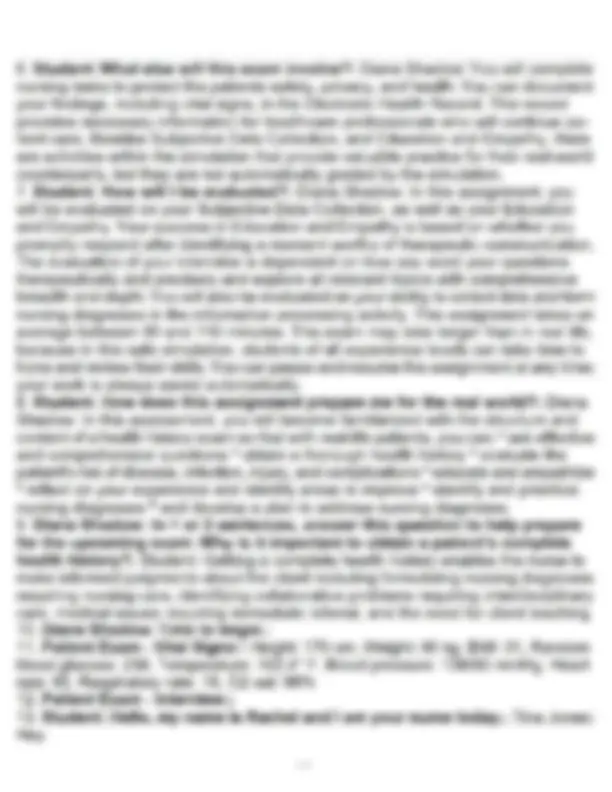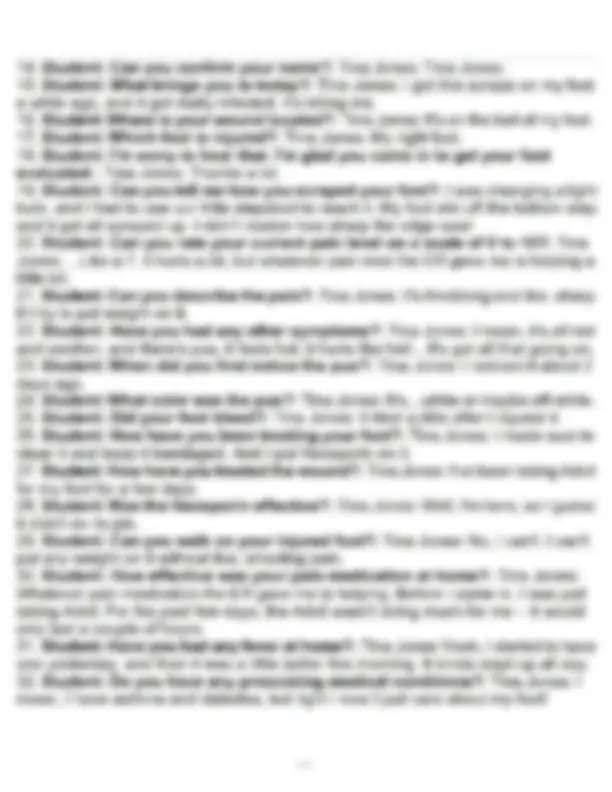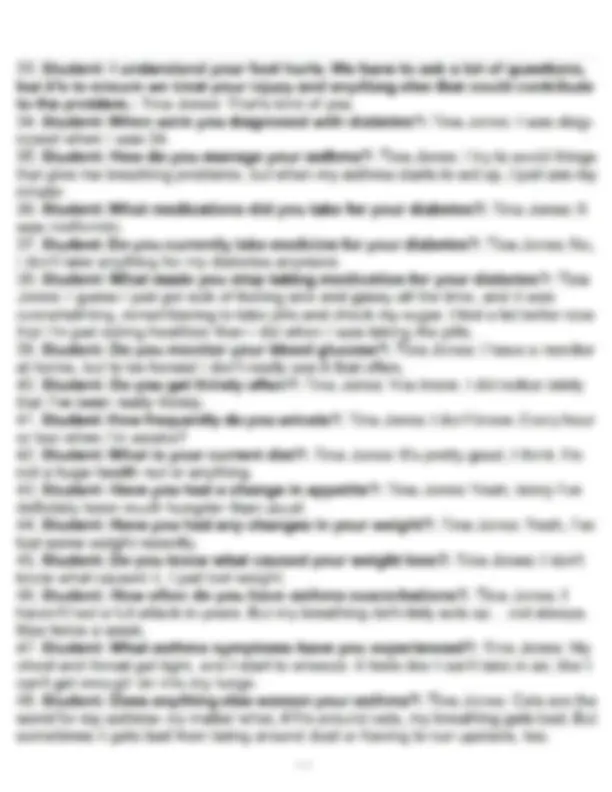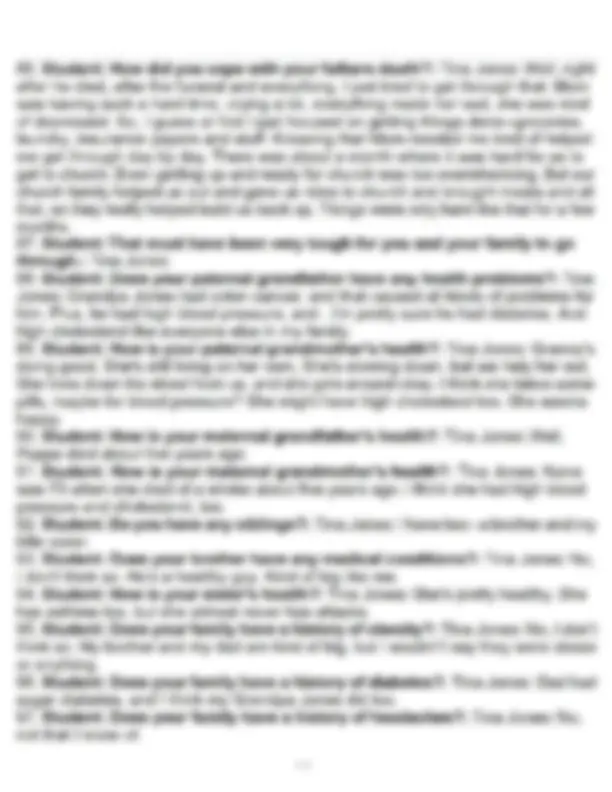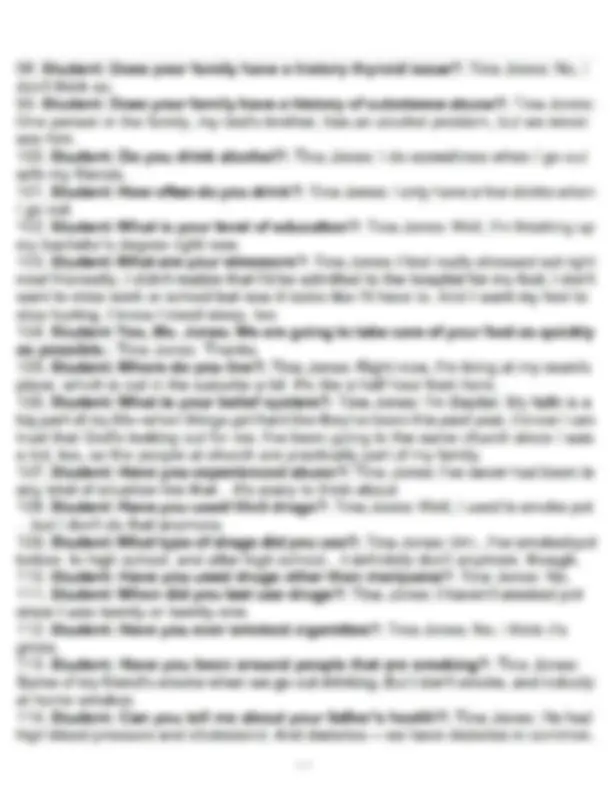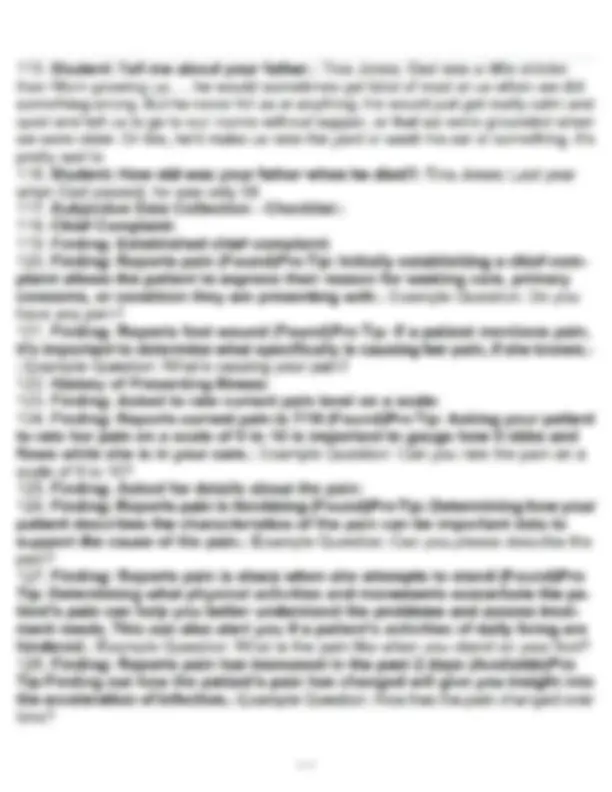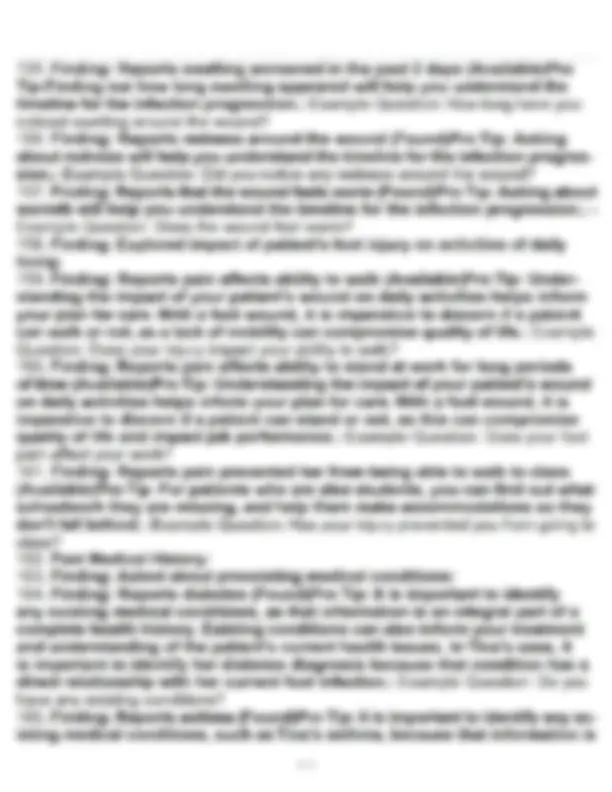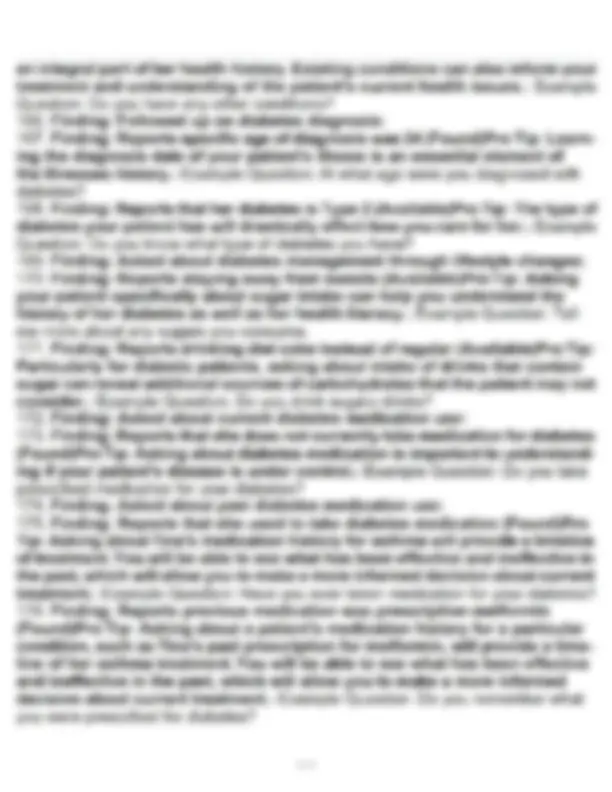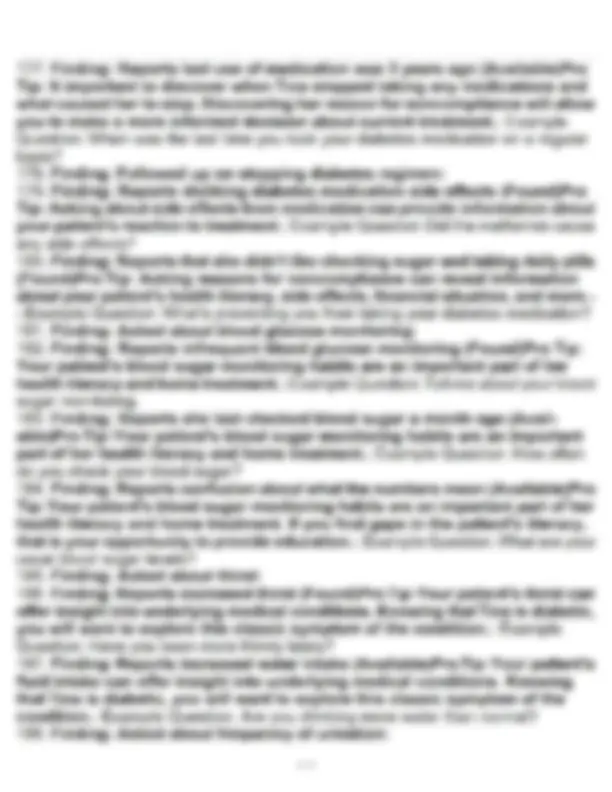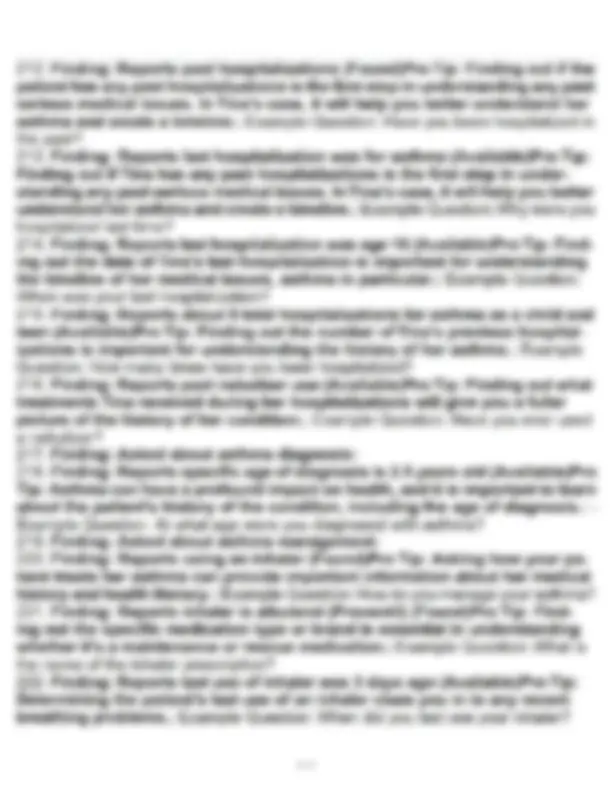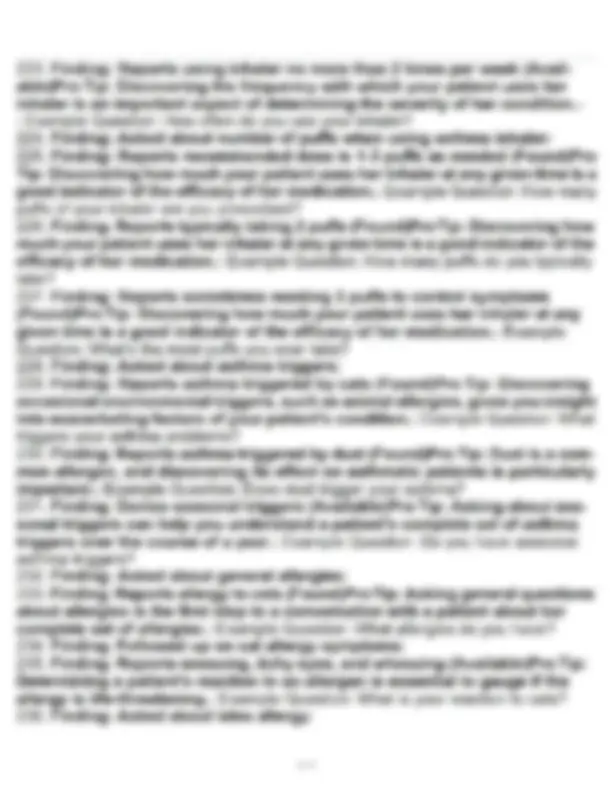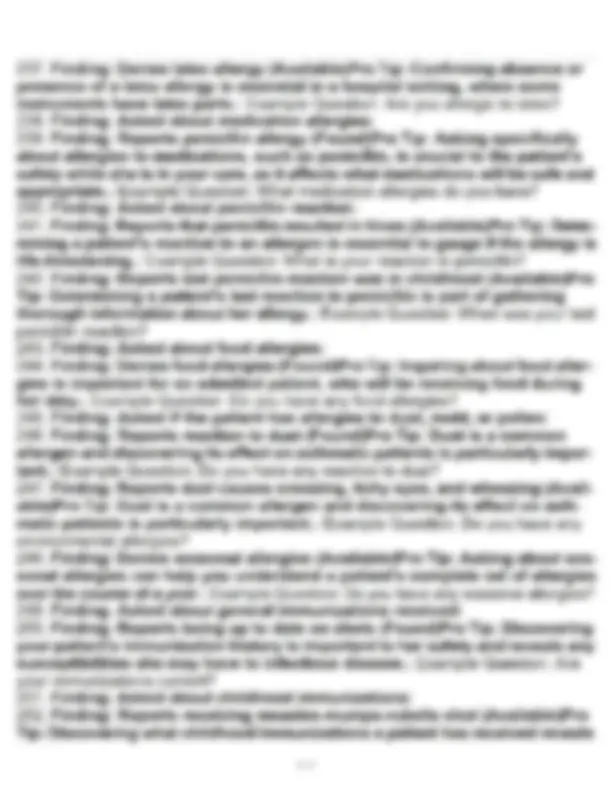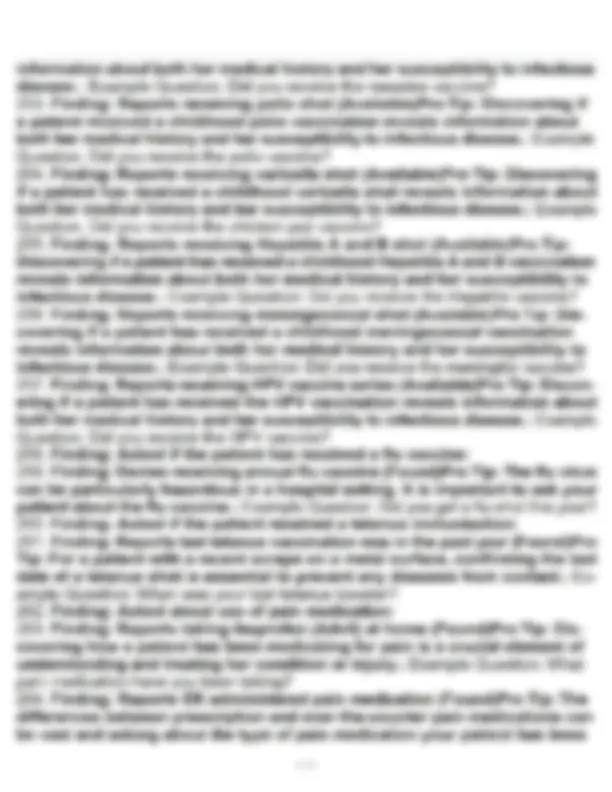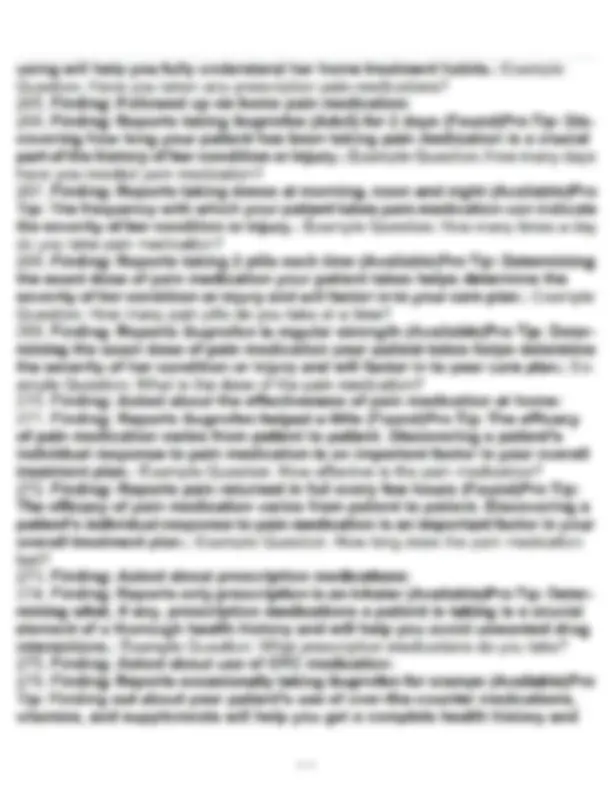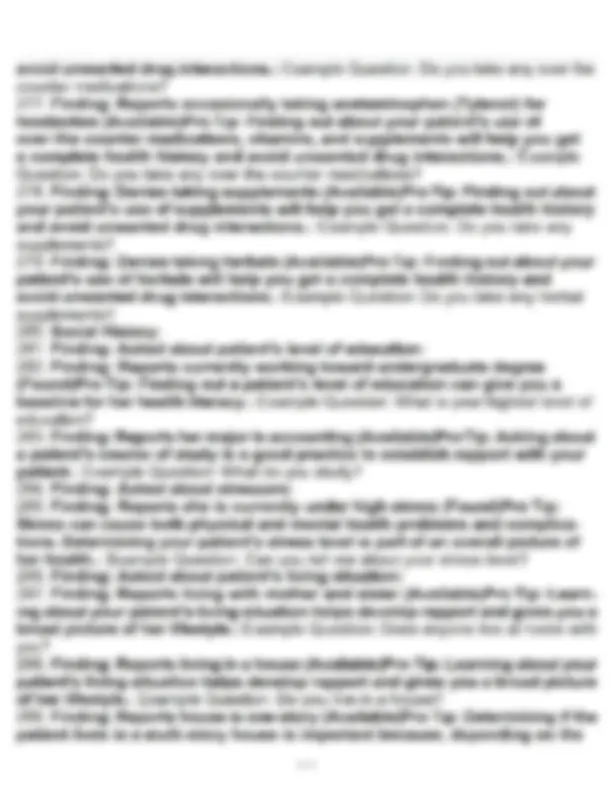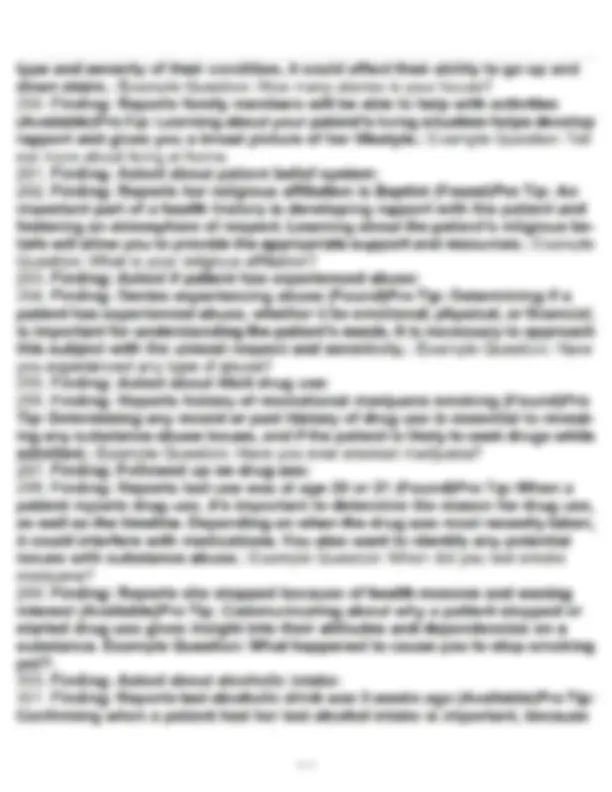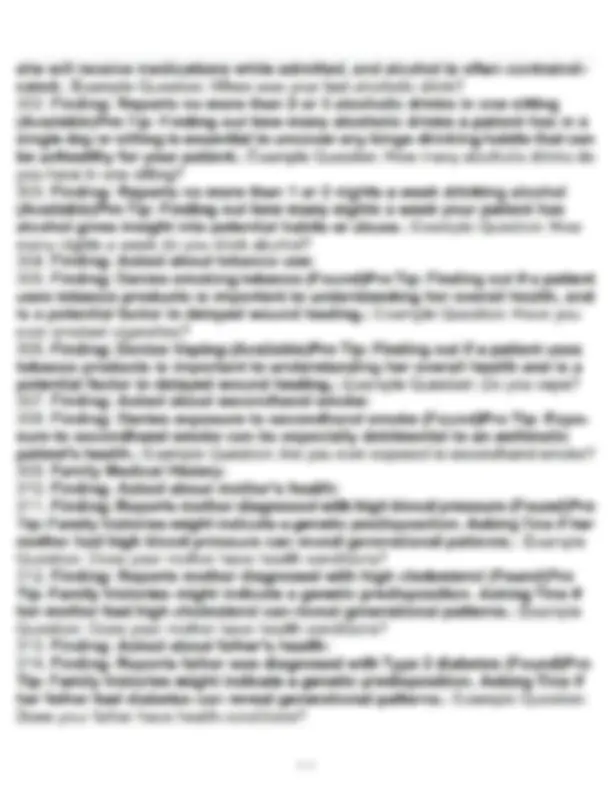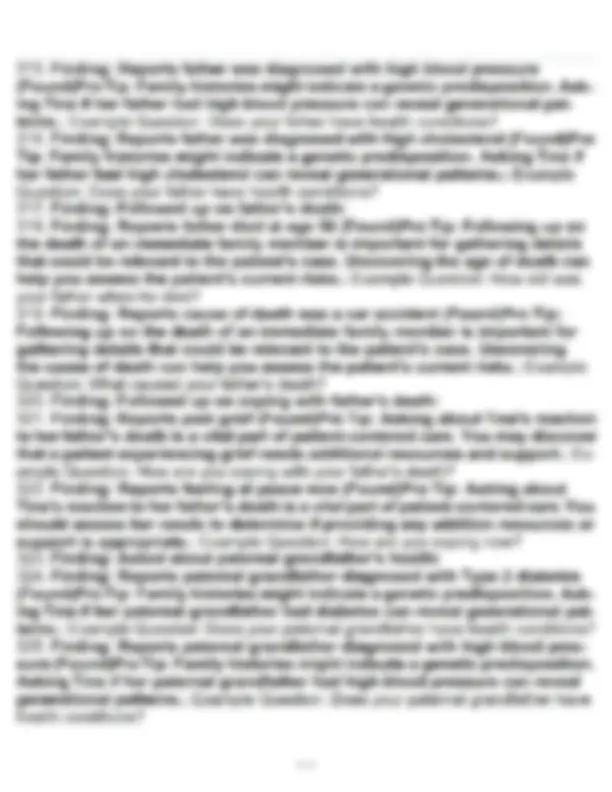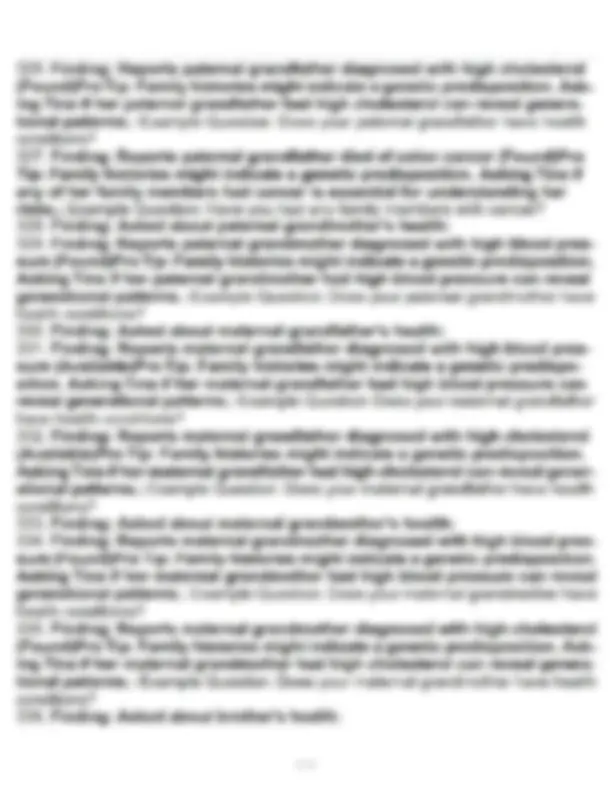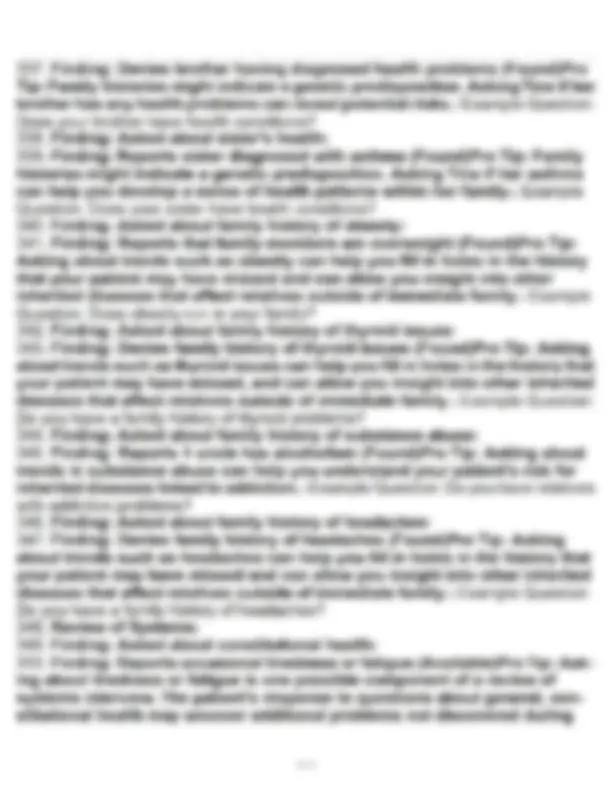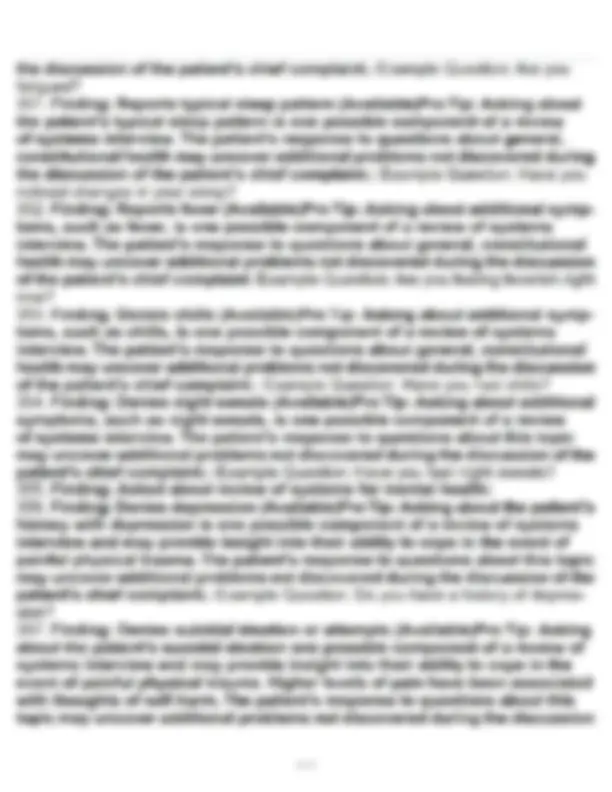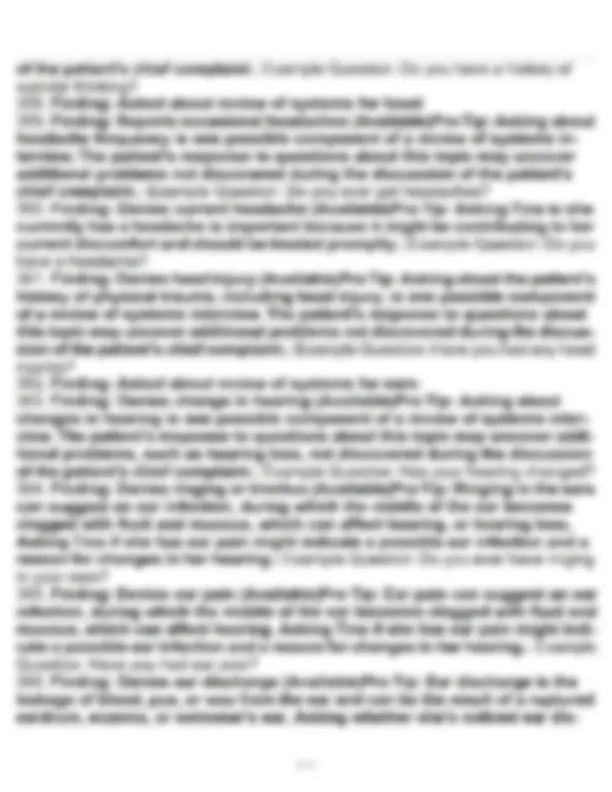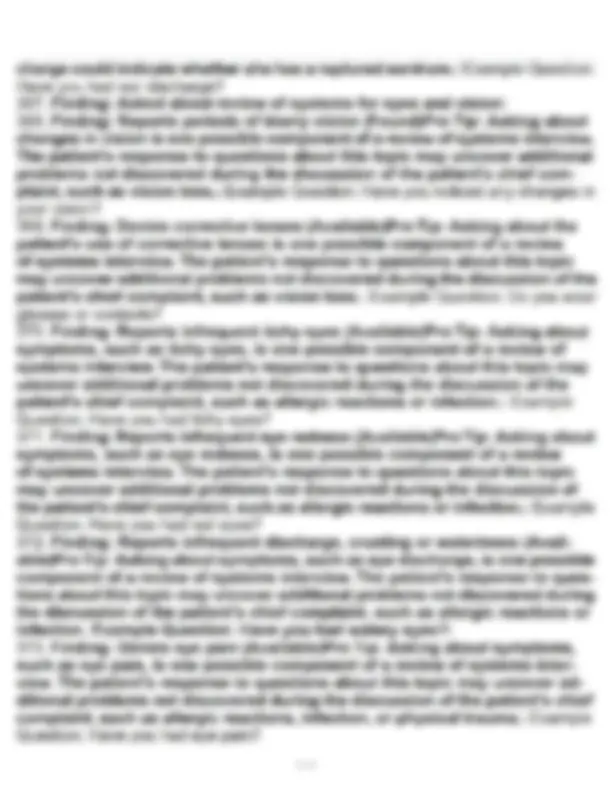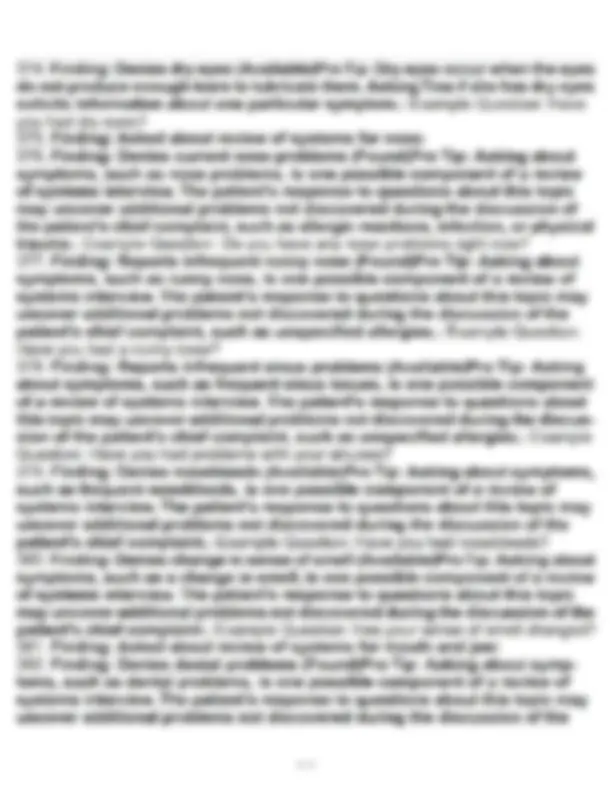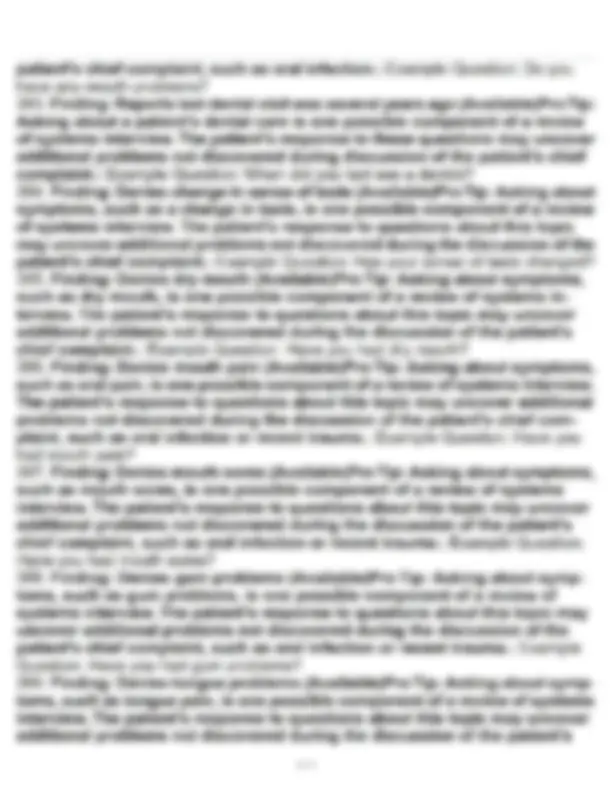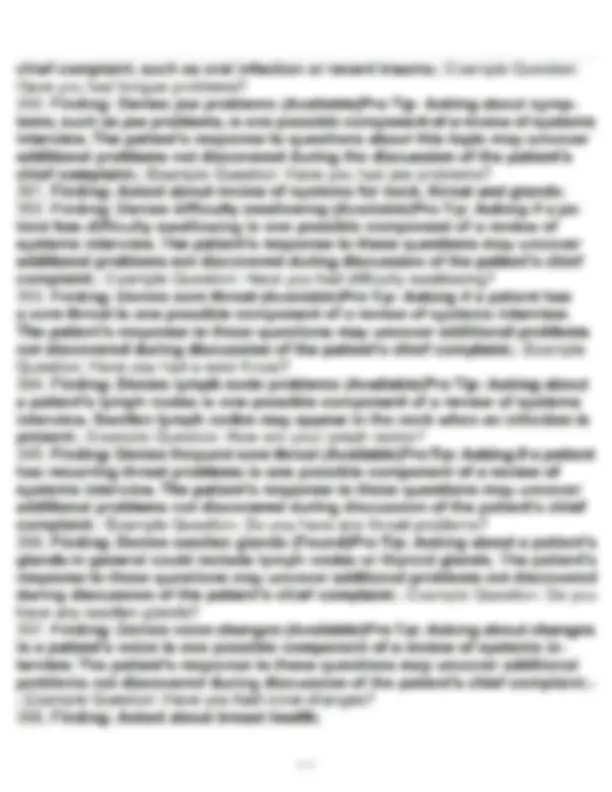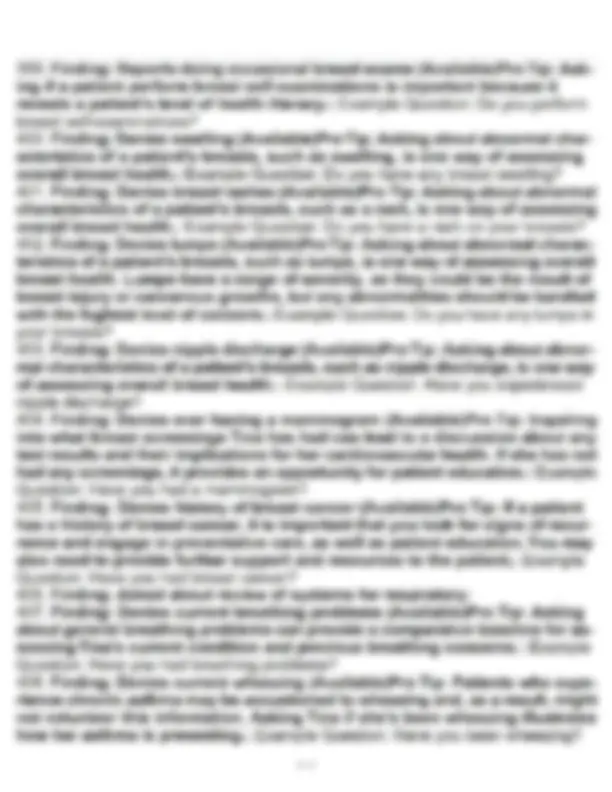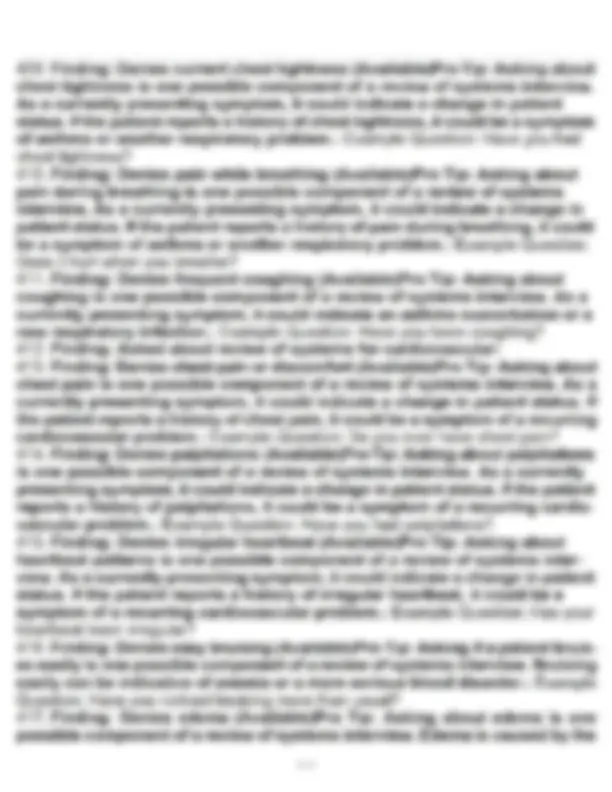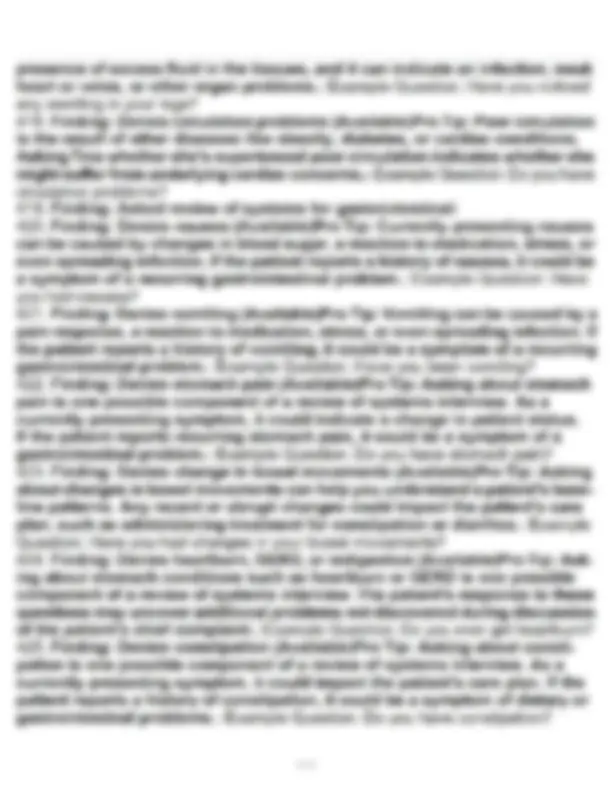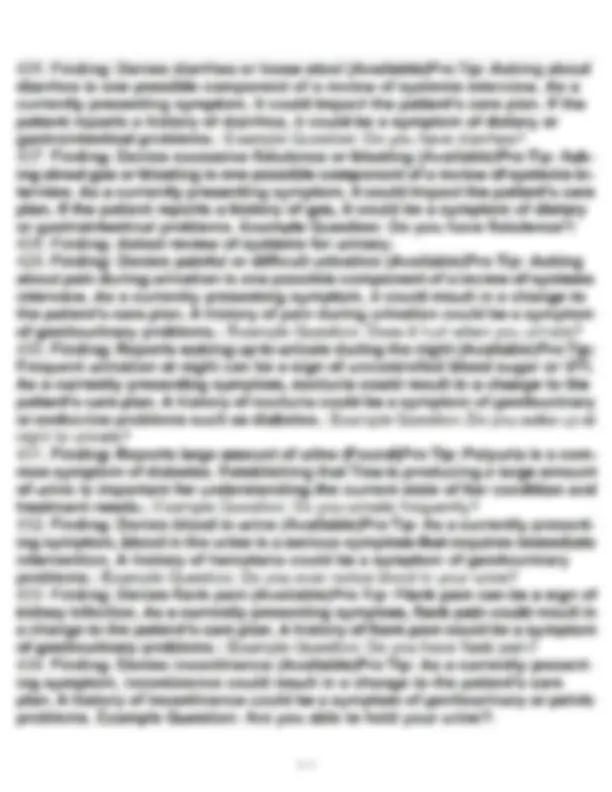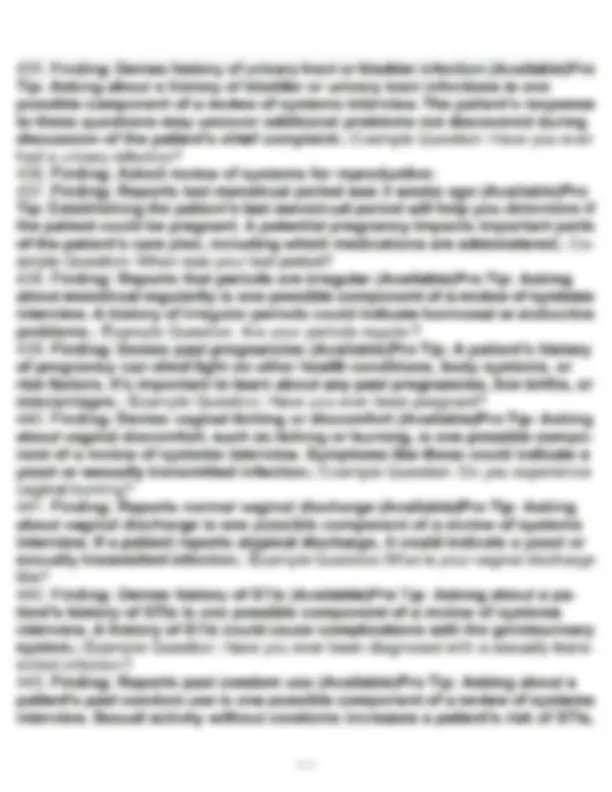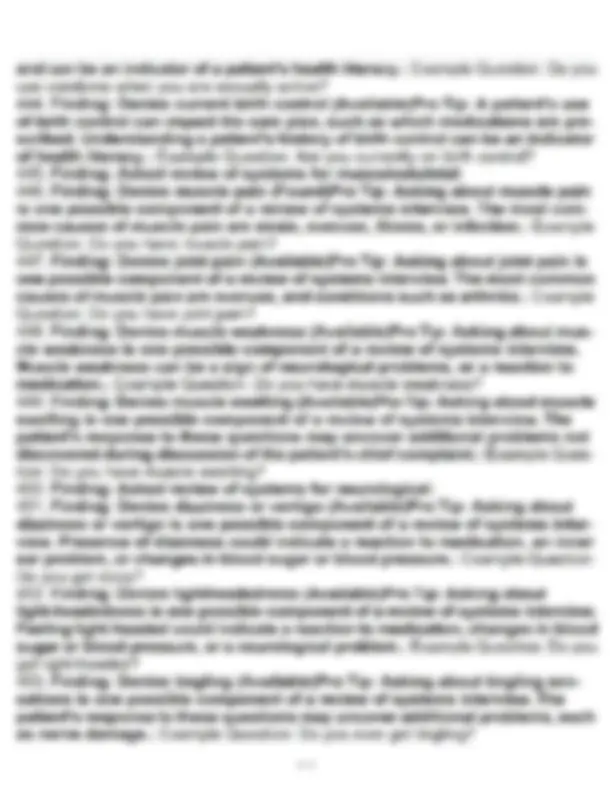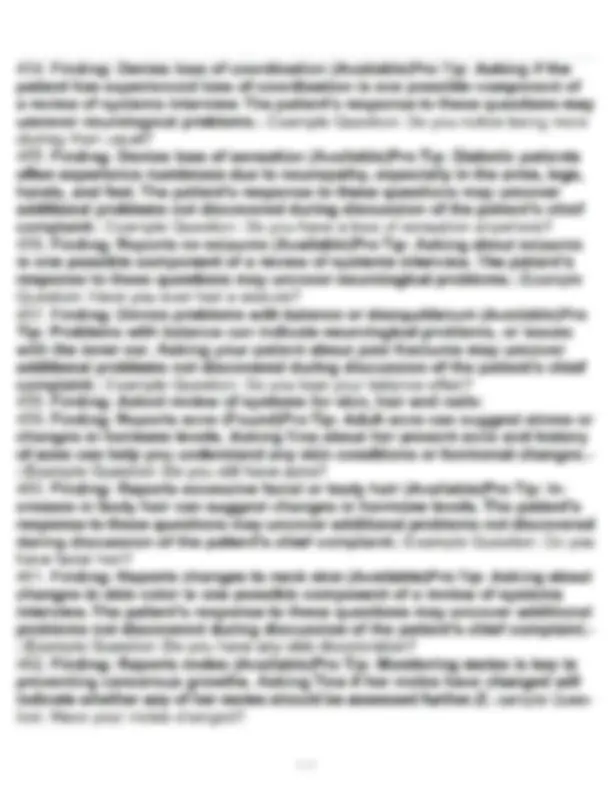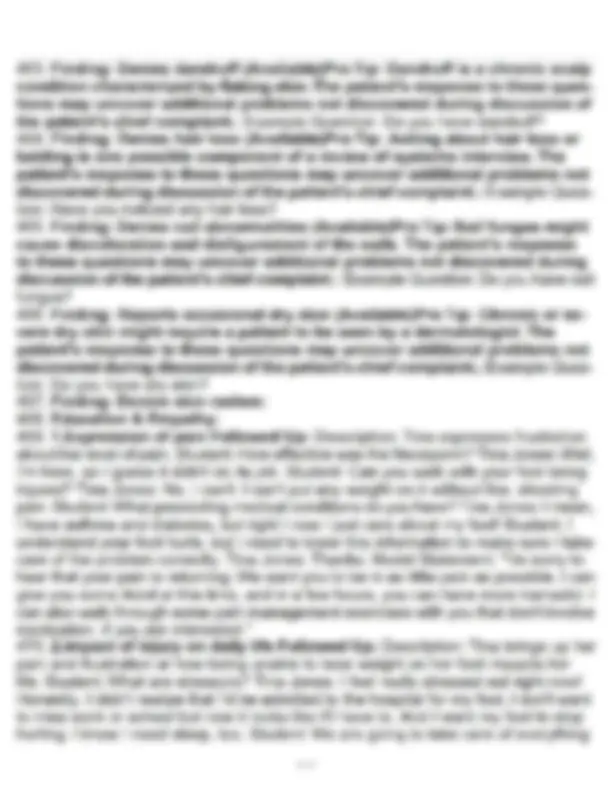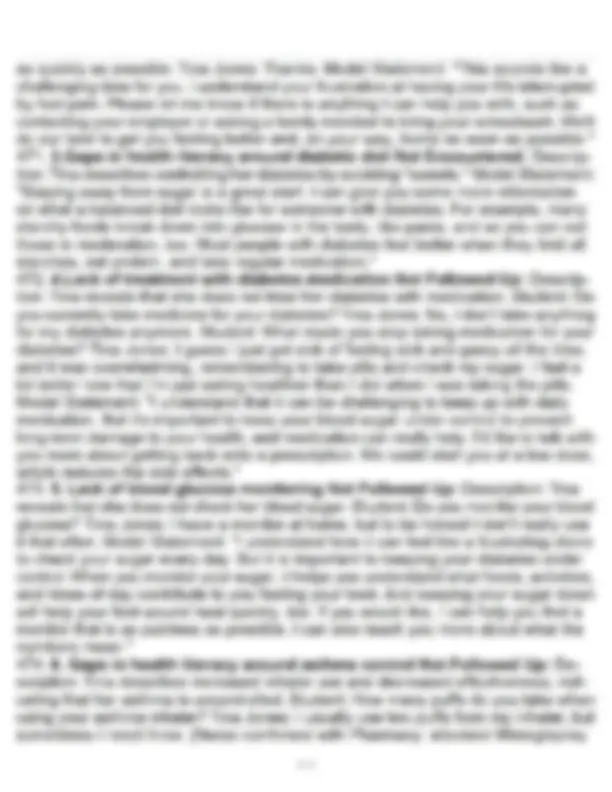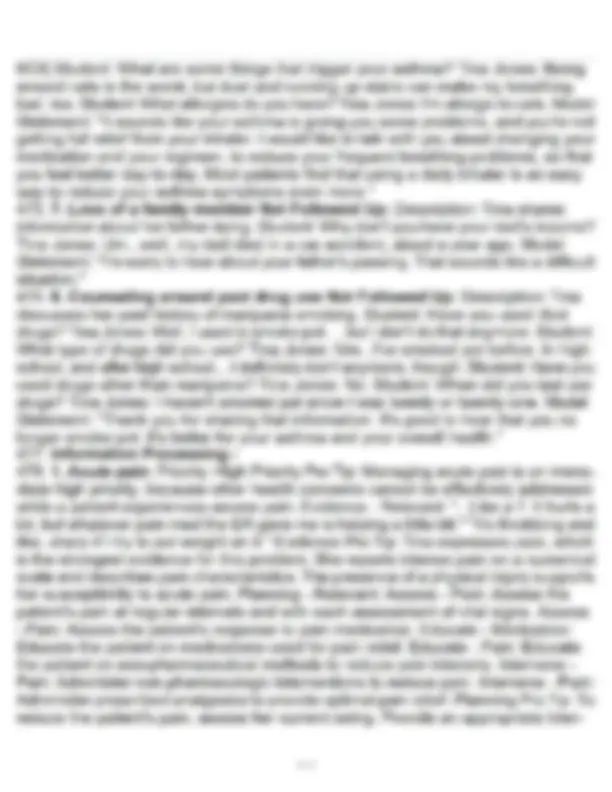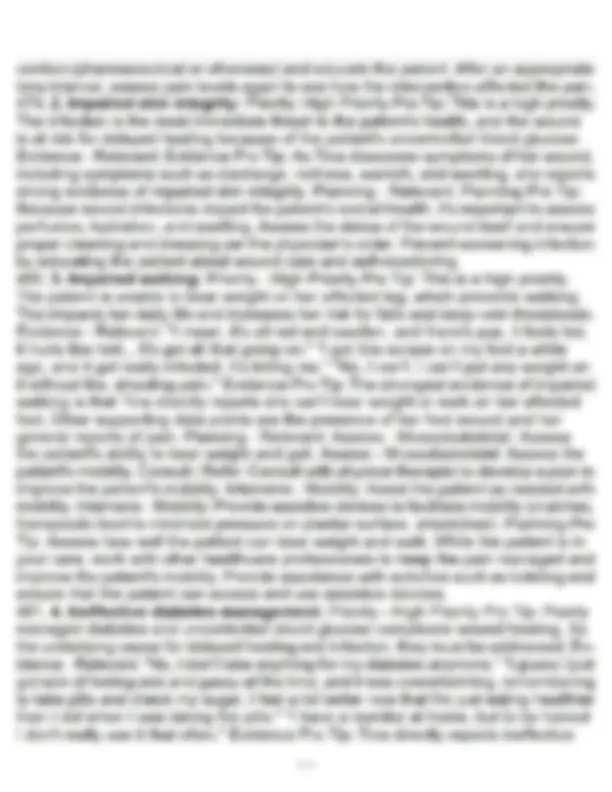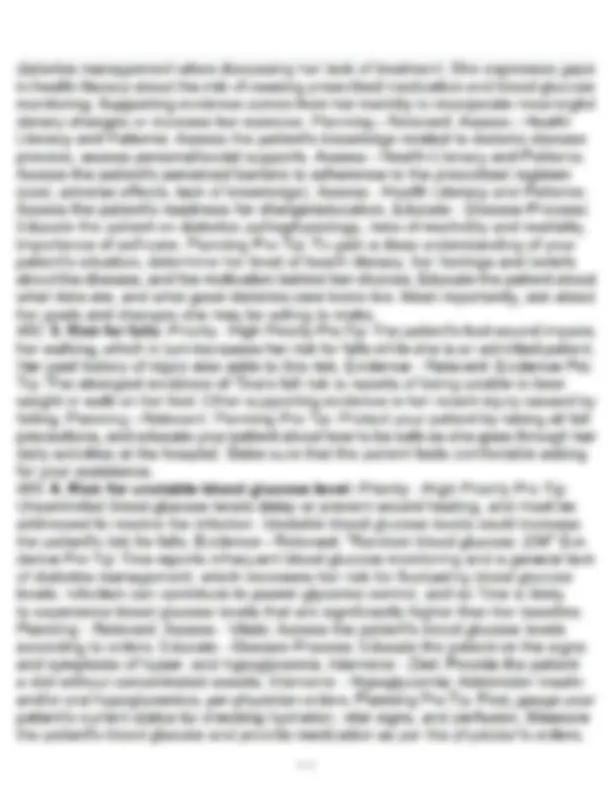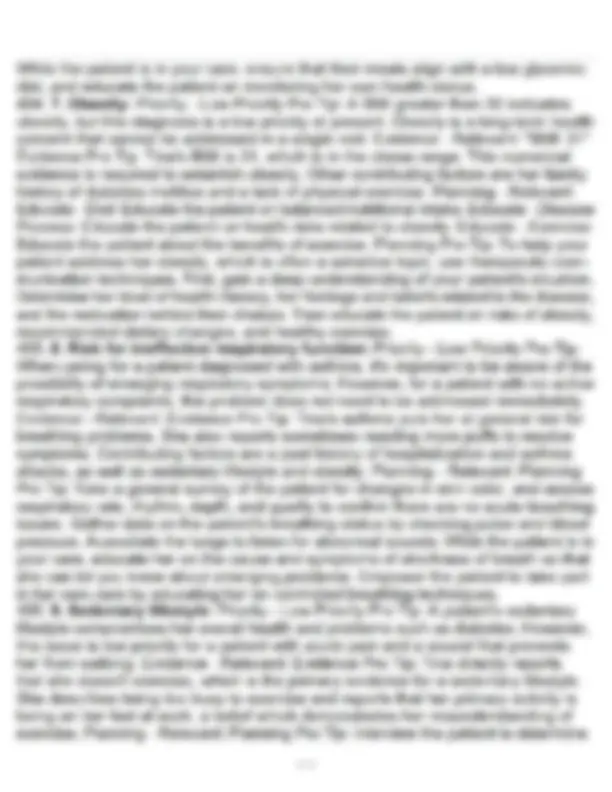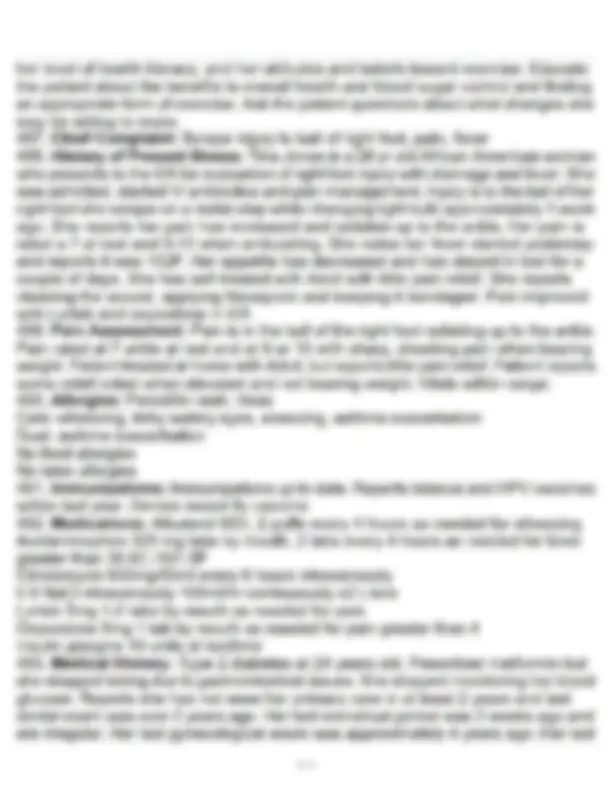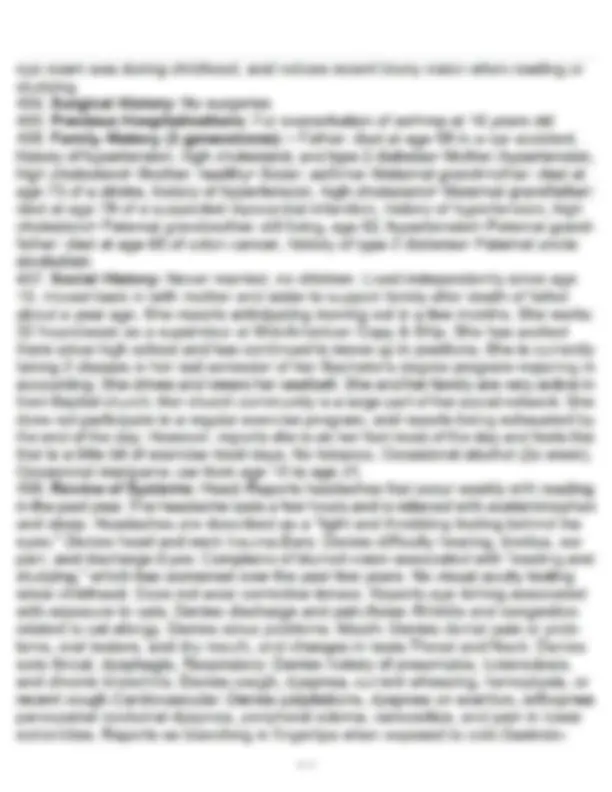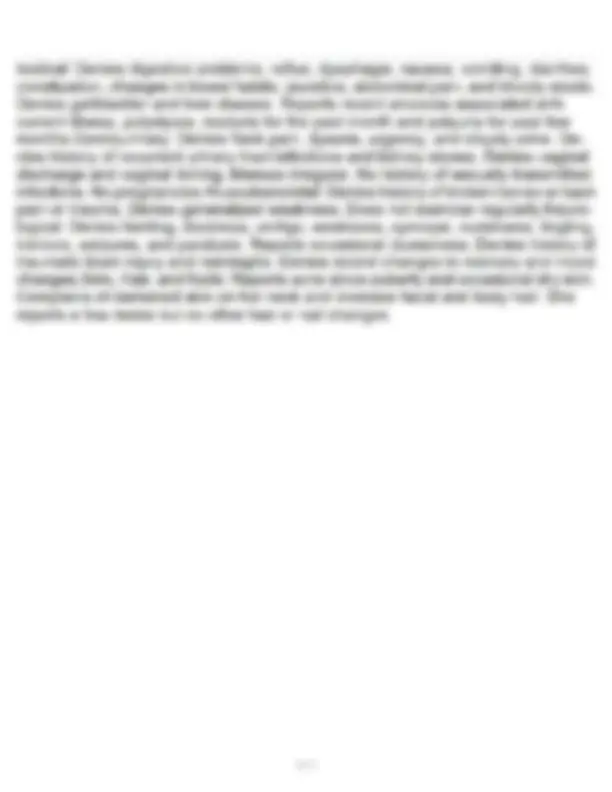Partial preview of the text
Download Shadow Health Tina Jones Health History Interview & Answers Nursing Digital Clinical Exper and more Exams Advanced Education in PDF only on Docsity!
Shadow Health Tina Jones Health History Interview & Answers Nursing Digital Clinical Experience questions and answers correct and verified A+ tips 1. Medications: Albuterol MDI, 2 puffs every 4 hours as needed for wheezing Acetaminophen 325 mg tabs by mouth, 2 tabs every 4 hours as needed for fever greater than 38.6C /101.5F Clindamycin 600mg/50ml every 6 hours intravenously 0.9 NaCl intravenously 100 ml/hr continuously x2 Liters Lortab 5mg 1-2 tabs by mouth as needed for pain Oxycodone 5mg 1 tab by mouth as needed Insulin glargine 10 units at bedtime 2. Health History Tips & Tricks:: 3. Student: Hello!: Diana Shadow: Hi. I'm Preceptor Diana. | will explain the details of this assignment and your objectives, just as a preceptor would in real life. Pay close attention to this information as it will help guide your exam. At the end of this prebrief, you will answer a short question about the upcoming assignment. During the simulation, you may return to these instructions at any time by scrolling to the top of your transcript. 4. Student: What is the situation?: Diana Shadow: Your patient is Tina Jones:, a 28-year-old African American woman who has just been admitted to Shadow General Hospital for a painful foot wound. Your role in this simulation is that of a healthcare provider who will take Ms. Jones’ health history, a key component of her admission process. 5. Student: What are my objectives in this assessment?: Diana Shadow: A health history requires you to ask questions related to Ms. Jones’ past and present health, from her current foot wound to her pre-existing conditions. You will also want to review Ms. Jones’ systems, psychosocial history, and family medical history. These assessments together will give you a comprehensive picture of Ms. Jones’ overall health. If you discover any disease states, ask about symptoms and the patient's experiences of them. Your questioning should cover a broad array of the symptoms' characteristics. Throughout the conversation, you should educate and empathize with Ms. Jones when appropriate to increase her health literacy and sense of well-being. Regardless of whether you have assessed Ms. Jones previously, ask all questions that are necessary for obtaining a complete health history. While you should communicate with patients using accessible, everyday language, it is standard practice to use professional medical terminology everywhere else, such as in documenting physical findings and nursing notes. You may complete the exam activities in any order and move between them as needed. After obtaining Ms. Jones' health history, you will complete an information processing activity. You will identify and prioritize diagnoses, then create a plan to address the identified diagnoses. 2/50 14. Student: Can you confirm your name?: Tina Jones: Tina Jones:. 15. Student: What brings you in today?: Tina Jones: | got this scrape on my foot a while ago, and it got really infected. It's killing me. 16. Student: Where is your wound located?: Tina Jones: It's on the ball of my foot. 17. Student: Which foot is injured?: Tina Jones: My right foot. 18. Student: I'm sorry to hear that. I'm glad you came in to get your foot evaluated.: Tina Jones: Thanks a lot. 19. Student: Can you tell me how you scraped your foot?: | was changing a light bulb, and | had to use our little stepstool to reach it. My foot slid off the bottom step and it got all scraped up. | didn't realize how sharp the edge was! 20. Student: Can you rate your current pain level on a scale of 0 to 10?: Tina Jones: ...Like a 7. It hurts a lot, but whatever pain med the ER gave me is helping a little bit. 21. Student: Can you describe the pain?: Tina Jones: It's throbbing and like, sharp if | try to put weight on it. 22. Student: Have you had any other symptoms?: Tina Jones: | mean, it's all red and swollen, and there's pus, it feels hot, it hurts like hell... It's got all that going on. 23. Student: When did you first notice the pus?: Tina Jones: | noticed it about 2 days ago. 24. Student: What color was the pus?: Tina Jones: It's... white or maybe off-white. 25. Student: Did your foot bleed?: Tina Jones: It bled a little after | injured it. 26. Student: How have you been treating your foot?: Tina Jones: | made sure to clean it and keep it bandaged. And | put Neosporin on it. 27. Student: How have you treated the wound?: Tina Jones: I've been taking Advil for my foot for a few days. 28. Student: Was the Neosporin effective?: Tina Jones: Well, I'm here, so | guess it didn't do its job. 29. Student: Can you walk on your injured foot?: Tina Jones: No, | can't. | can't put any weight on it without like, shooting pain. 30. Student: How effective was your pain medication at home?: Tina Jones: Whatever pain medication the ER gave me is helping. Before | came in, | was just taking Advil. For the past few days, the Advil wasn't doing much for me -- it would only last a couple of hours. 31. Student: Have you had any fever at home?: Tina Jones: Yeah, | started to have one yesterday, and then it was a little better this morning. It kinda crept up all day. 32. Student: Do you have any preexisting medical conditions?: Tina Jones: | mean, | have asthma and diabetes, but right | now | just care about my foot! 4/50 33. Student: | understand your foot hurts. We have to ask a lot of questions, but it's to ensure we treat your injury and anything else that could contribute to the problem.: Tina Jones: That's kind of you. 34. Student: When were you diagnosed with diabetes?: Tina Jones: | was diag- nosed when | was 24. 35. Student: How do you manage your asthma?: Tina Jones: | try to avoid things that give me breathing problems, but when my asthma starts to act up, | just use my inhaler. 36. Student: What medications did you take for your diabetes?: Tina Jones: It was metformin. 37. Student: Do you currently take medicine for your diabetes?: Tina Jones: No, | don't take anything for my diabetes anymore. 38. Student: What made you stop taking medication for your diabetes?: Tina Jones: | guess | just got sick of feeling sick and gassy all the time, and it was overwhelming, remembering to take pills and check my sugar. | feel a lot better now that I'm just eating healthier than | did when | was taking the pills. 39. Student: Do you monitor your blood glucose?: Tina Jones: | have a monitor at home, but to be honest | don't really use it that often. 40. Student: Do you get thirsty often?: Tina Jones: You know, | did notice lately that I've been really thirsty. 41. Student: How frequently do you urinate?: Tina Jones: | don't know. Every hour or two when I'm awake? 42. Student: What is your current diet?: Tina Jones: It's pretty good, | think. I'm not a huge health nut or anything. 43. Student: Have you had a change in appetite?: Tina Jones: Yeah, lately I've definitely been much hungrier than usual. 44. Student: Have you had any changes in your weight?: Tina Jones: Yeah, I've lost some weight recently. 45. Student: Do you know what caused your weight loss?: Tina Jones: | don't know what caused it, | just lost weight. 46. Student: How often do you have asthma exacerbations?: Tina Jones: | haven't had a full attack in years. But my breathing definitely acts up. . .not always. Max twice a week. 47. Student: What asthma symptoms have you experienced?: Tina Jones: My chest and throat get tight, and | start to wheeze. It feels like | can't take in air, like | can't get enough air into my lungs. 48. Student: Does anything else worsen your asthma?: Tina Jones: Cats are the worst for my asthma--no matter what, if I'm around cats, my breathing gets bad. But sometimes it gets bad from being around dust or having to run upstairs, too. 66. Student: Do you have a family history of psychiatric illness?: Tina Jones: No. They're crazy, but nobody's diagnosed with anything. 67. Student: Do you have any neck, throat or gland problems?: Tina Jones: No, not that | noticed. 68. Student: Any problems with your ears?: Tina Jones: No. 69. Student: Any problems with your eyes and vision?: Tina Jones: I've actually been noticing problems lately. When I'm reading or studying I'll notice that things start to get kind of blurry. 70. Student: Do you suffer from headaches?: Tina Jones: | get headaches some- times, but that's all. 71. Student: Do you wear glasses?: Tina Jones: No. 72. Student: Any problems with sinuses or nose?: Tina Jones: My nose is fine right now. Sometimes it runs, but not very often. 73. Student: Do you have problems with your mouth?: Tina Jones: No. 74. Student: Do you have a history of cardiovascular problems?: Tina Jones: My heart's fine, thank God! 75. Student: Have you had any problems with your breasts?: Tina Jones: | haven't noticed any pain there. 76. Student: Have you had any reproductive problems?: Tina Jones: | don't think | have problems in that area. | just get really bad periods, that's all. 77. Student: Have you had any neurological problems?: Tina Jones: No, | haven't. 78. Student: Have you had any musculoskeletal problems?: Tina Jones: No. 79. Student: Do you have a history of skin disorders?: Tina Jones: Um, | have acne, if that counts. 80. Student: Does your mother have any health issues?: Tina Jones: Mom has high cholesterol and blood pressure, | think. She seems to be doing okay though. 81. Student: Does your father have any health problems?: Tina Jones: Well, he passed away. But he had a couple things... Type 2 diabetes, like me, and high cholesterol and blood pressure. 82. Student: I'm sorry to hear about your father's passing.: Tina Jones: Thanks. 83. Student: How did your father pass away?: Tina Jones: He died in a car accident. 84. Student: When did your father's car accident happen?: Tina Jones: It was last year... | guess a little over a year ago. 85. Student: Do you know what caused your dad's accident?: Tina Jones: He was driving to work, and it was raining...and his car hydroplaned. And hit a tree. So, it was really sudden. 7/30 86. Student: How did you cope with your fathers death?: Tina Jones: Well, right after he died, after the funeral and everything, | just tried to get through that. Mom was having such a hard time, crying a lot, everything made her sad, she was kind of depressed. So, | guess at first | just focused on getting things done--groceries, laundry, insurance papers and stuff. Knowing that Mom needed me kind of helped me get through day by day. There was about a month where it was hard for us to get to church. Even getting up and ready for church was too overwhelming. But our church family helped us out and gave us rides to church and brought meals and all that, so they really helped build us back up. Things were only hard like that for a few months. 87. Student: That must have been very tough for you and your family to go through.: Tina Jones: 88. Student: Does your paternal grandfather have any health problems?: Tina Jones: Grandpa Jones had colon cancer, and that caused all kinds of problems for him. Plus, he had high blood pressure, and...I'm pretty sure he had diabetes. And high cholesterol like everyone else in my family. 89. Student: How is your paternal grandmother's health?: Tina Jones: Granny's doing good. She's still living on her own. She's slowing down, but we help her out. She lives down the street from us, and she gets around okay. | think she takes some pills, maybe for blood pressure? She might have high cholesterol too. She seems happy. 90. Student: How is your maternal grandfather's health?: Tina Jones: Well, Poppa died about five years ago. 91. Student: How is your maternal grandmother's health?: Tina Jones: Nana was 73 when she died of a stroke about five years ago. | think she had high blood pressure and cholesterol, too. 92. Student: Do you have any siblings?: Tina Jones: | have two--a brother and my little sister. 93. Student: Does your brother have any medical conditions?: Tina Jones: No, | don't think so. He's a healthy guy. Kind of big like me. 94. Student: How is your sister's health?: Tina Jones: She's pretty healthy. She has asthma too, but she almost never has attacks. 95. Student: Does your family have a history of obesity?: Tina Jones: No, | don't think so. My brother and my dad are kind of big, but | wouldn't say they were obese or anything. 96. Student: Does your family have a history of diabetes?: Tina Jones: Dad had sugar diabetes, and | think my Grandpa Jones did too. 97. Student: Does your family have a history of headaches?: Tina Jones: No, not that | know of. 8/50 115. Student: Tell me about your father.: Tina Jones: Dad was a little stricter than Mom growing up. . . he would sometimes get kind of mad at us when we did something wrong. But he never hit us or anything. He would just get really calm and quiet and tell us to go to our rooms without supper, or that we were grounded when we were older. Or like, he'd make us rake the yard or wash his car or something. It's pretty sad to 116. Student: How old was your father when he died?: Tina Jones: Last year when Dad passed, he was only 58. 117. Subjective Data Collection - Checklist:: 118. Chief Complaint: 119. Finding: Established chief complaint: 120. Finding: Reports pain (Found)Pro Tip: Initially establishing a chief com- plaint allows the patient to express their reason for seeking care, primary concerns, or condition they are presenting with.: Example Question: Do you have any pain? 121. Finding: Reports foot wound (Found)Pro Tip: If a patient mentions pain, it's important to determine what specifically is causing her pain, if she knows.- : Example Question: What's causing your pain? 122. History of Presenting Illness: 123. Finding: Asked to rate current pain level on a scale: 124. Finding: Reports current pain is 7/10 (Found)Pro Tip: Asking your patient to rate her pain on a scale of 0 to 10 is important to gauge how it ebbs and flows while she is in your care.: Example Question: Can you rate the pain ona scale of 0 to 10? 125. Finding: Asked for details about the pain: 126. Finding: Reports pain is throbbing (Found)Pro Tip: Determining how your patient describes the characteristics of the pain can be important data to support the cause of the pain.: Example Question: Can you please describe the pain? 127. Finding: Reports pain is sharp when she attempts to stand (Found)Pro Tip: Determining what physical activities and movements exacerbate the pa- tient’s pain can help you better understand the problems and assess treat- ment needs. This can also alert you if a patient's activities of daily living are hindered.: Example Question: What is the pain like when you stand on your foot? 128. Finding: Reports pain has increased in the past 2 days (Available)Pro Tip:Finding out how the patient's pain has changed will give you insight into the acceleration of infection.: Example Question: How has the pain changed over time? 129. Finding: Reports feeling pain radiating into ankle (Available)Pro Tip: Ask- ing about where else the patient's pain radiates can help determine the pro- gression of infection.: Example Question: Does the pain radiate anywhere else? 130. Finding: Reports pain prevents bearing weight on foot (Found)Pro Tip: Determining if your patient can bear weight on an injury is important to determine their risk for falls while in your care.: Example Question: Can you bear weight on your foot? 131. Finding: Asked location of wound: 132. Finding: Reports right foot is injured (Found)Pro Tip: Confirming which extremity an injury is located is a best practice for your patient's safety.: Ex- ample Question: Which foot is in pain? 133. Finding: Reports wound is on the plantar surface of her foot (Found)Pro Tip: Confirming where a wound is located ensures you are aware of your patient's biggest complaint.: Example Question: Where is the wound? 134. Finding: Asked details of the injury: 135. Finding: Reports she scraped foot on bottom rung of a step stool (Found)Pro Tip: Discovering how an injury happened helps to assess your patient's risk factors for injury.: Example Question: How did your injury happen? 136. Finding: Reports injury occurred 1 week ago (Available)Pro Tip: Discov- ering how long ago the pain began is the first step in understanding whether the pain is chronic or acute.: Example Question: When did your injury occur? 137. Finding: Denies other injuries besides foot wound (Available)Pro Tip: Discovering additional injuries can reveal more information about the circum- stances that caused the presenting injury.: Example Question: Did you injure anything besides your foot? 138. Finding: Reports being barefoot at the time of injury (Available)Pro Tip: Asking about clothing, footwear, and other protective elements being worn at the time of injury helps you discover the totality of the circumstances.: Exam- ple Question: Were you wearing shoes when you fell? 139. Finding: Denies seeing a healthcare provider for the injury until now (Available)Pro Tip: It's crucial to ask whether your patient has seen another provider for the injury, because any previous medical intervention will help you understand the progression of the wound.: Example Question: Have you seen a healthcare provider for this injury? 140. Finding: Asked about drainage from the foot wound: 141. Finding: Reports that the wound bled a little after sustaining the injury (Available)Pro Tip: Asking about bleeding helps you determine the character- istics of a wound.: Example Question: Did your foot bleed? 155. Finding: Reports swelling worsened in the past 2 days (Available)Pro Tip:Finding out how long swelling appeared will help you understand the timeline for the infection progression.: Example Question: How long have you noticed swelling around the wound? 156. Finding: Reports redness around the wound (Found)Pro Tip: Asking about redness will help you understand the timeline for the infection progres- sion.: Example Question: Did you notice any redness around the wound? 157. Finding: Reports that the wound feels warm (Found)Pro Tip: Asking about warmth will help you understand the timeline for the infection progression.: - Example Question: Does the wound feel warm? 158. Finding: Explored impact of patient's foot injury on activities of daily living: 159. Finding: Reports pain affects ability to walk (Available)Pro Tip: Under- standing the impact of your patient's wound on daily activities helps inform your plan for care. With a foot wound, it is imperative to discern if a patient can walk or not, as a lack of mobility can compromise quality of life.: Example Question: Does your injury impact your ability to walk? 160. Finding: Reports pain affects ability to stand at work for long periods of time (Available)Pro Tip: Understanding the impact of your patient's wound on daily activities helps inform your plan for care. With a foot wound, it is imperative to discern if a patient can stand or not, as this can compromise quality of life and impact job performance.: Example Question: Does your foot pain affect your work? 161. Finding: Reports pain prevented her from being able to walk to class (Available)Pro Tip: For patients who are also students, you can find out what schoolwork they are missing, and help them make accommodations so they don't fall behind.: Example Question: Has your injury prevented you from going to class? 162. Past Medical History: 163. Finding: Asked about preexisting medical conditions: 164. Finding: Reports diabetes (Found)Pro Tip: It is important to identify any existing medical conditions, as that information is an integral part of a complete health history. Existing conditions can also inform your treatment and understanding of the patient's current health issues. In Tina's case, it is important to identify her diabetes diagnosis because that condition has a direct relationship with her current foot infection.: Example Question: Do you have any existing conditions? 165. Finding: Reports asthma (Found)Pro Tip: It is important to identify any ex- isting medical conditions, such as Tina's asthma, because that information is an integral part of her health history. Existing conditions can also inform your treatment and understanding of the patient's current health issues.: Example Question: Do you have any other conditions? 166. Finding: Followed up on diabetes diagnosis: 167. Finding: Reports specific age of diagnosis was 24 (Found)Pro Tip: Learn- ing the diagnosis date of your patient's illness is an essential element of the illnesses history.: Example Question: At what age were you diagnosed with diabetes? 168. Finding: Reports that her diabetes is Type 2 (Available)Pro Tip: The type of diabetes your patient has will drastically affect how you care for her.: Example Question: Do you know what type of diabetes you have? 169. Finding: Asked about diabetes management through lifestyle changes: 170. Finding: Reports staying away from sweets (Available)Pro Tip: Asking your patient specifically about sugar intake can help you understand the history of her diabetes as well as her health literacy.: Example Question: Tell me more about any sugars you consume. 171. Finding: Reports drinking diet coke instead of regular (Available)Pro Tip: Particularly for diabetic patients, asking about intake of drinks that contain sugar can reveal additional sources of carbohydrates that the patient may not consider.: Example Question: Do you drink sugary drinks? 172. Finding: Asked about current diabetes medication use: 173. Finding: Reports that she does not currently take medication for diabetes (Found)Pro Tip: Asking about diabetes medication is important to understand- ing if your patient's disease is under control.: Example Question: Do you take prescribed medication for your diabetes? 174. Finding: Asked about past diabetes medication use: 175. Finding: Reports that she used to take diabetes medication (Found)Pro Tip: Asking about Tina's medication history for asthma will provide a timeline of treatment. You will be able to see what has been effective and ineffective in the past, which will allow you to make a more informed decision about current treatment.: Example Question: Have you ever taken medication for your diabetes? 176. Finding: Reports previous medication was prescription metformin (Found)Pro Tip: Asking about a patient's medication history for a particular condition, such as Tina's past prescription for metformin, will provide a time- line of her asthma treatment. You will be able to see what has been effective and ineffective in the past, which will allow you to make a more informed decision about current treatment.: Example Question: Do you remember what you were prescribed for diabetes? 189. Finding: Reports more frequent urination (Found)Pro Tip: Your patient's urination habits can offer insight into underlying medical conditions and general health. Knowing that Tina is diabetic, you will want to explore this classic symptom of the condition.: Example Question: Have you been urinating more often than usual? 190. Finding: Reports urinating every hour or two during the day (Found)Pro Tip: Your patient's urination habits can offer insight into underlying medical conditions and general health. Knowing that Tina is diabetic, you will want to explore this classic symptom of the condition.: Example Question: How often do you urinate during the day? 191. Finding: Reports urinating 2 to 3 times during the night (Available)Pro Tip: Discovering if Tina has nocturia can offer insight into underlying medical conditions and general health.: Example Question: How often do you wake up at night to urinate? 192. Finding: Asked about diet: 193. Finding: Reports eating a bowl of cereal for breakfast yesterday (Avail- able)Pro Tip: In a health history, it is important to get an idea of a patient's typical dietary patterns. This can be achieved by asking for a 24-hour diet recall.: Example Question: What did you eat for breakfast yesterday? 194. Finding: Reports eating mac and cheese for lunch yesterday (Avail- able)Pro Tip: In a health history, it is important to get an idea of a patient's typical dietary patterns. This can be achieved by asking for a 24-hour diet recall.: Example Question: What did you eat for lunch yesterday? 195. Finding: Reports eating chicken and roll for dinner yesterday (Avail- able)Pro Tip:Finding out the foods a patient last ate can provide evidence for any current stomach upset and for their current level of hunger and blood sugar status and can affect medications given while in your care.: Example Question: What did you eat for your last meal? 196. Finding: Asked about change in appetite: 197. Finding: Reports increased appetite (Found)Pro Tip: Identifying if a pa- tient has recently experienced a change in appetite is important, as it could indicate an underlying endocrine or psychiatric condition.: Example Question: Have you noticed an increase in appetite? 198. Finding: Reports change in appetite began a month ago (Available)Pro Tip: Determining the onset of appetite change can reveal important details about underlying health conditions.: Example Question: When did you notice the increase in your appetite? 199. Finding: Asked about weight change: 200. Finding: Reports recent loss of 10 Ibs (Available)Pro Tip: Determining the exact amount of weight loss can indicate whether it's within expected ranges, or extreme, which may indicate an underlying health problem. Example Ques- tion: How much weight have you lost?: 201. Finding: Reports weight loss occurred over the past month (Available)Pro Tip:Finding out the timeline for weight loss can indicate if it's sudden or gradual.: Example Question: How long did it take you to lose 10 pounds? 202. Finding: Followed up on reason for weight change: 203. Finding: Reports weight loss was unintentional (Found)Pro Tip: Unin- tentional weight loss can be a sign of underlying medical conditions or a reflection of unhealthy lifestyle choices. Asking your patient about this can inform your care plan.: Example Question: Was your weight loss intentional? 204. Finding: Asked about history of asthma exacerbations: 205. Finding: Reports last asthma attack was in high school (Available)Pro Tip: Discovering the patient's most recent asthma attack can provide a timeline of exacerbations and help you better understand the patient's condition and effectiveness of any treatments.: Example Question: When was your last asthma attack? 206. Finding: Reports last exacerbation was three days ago (Available)Pro Tip: Discovering the patient's most recent exacerbation can provide a timeline of asthma symptoms and help you better understand the patient's condition and effectiveness of any treatments.: Example Question: When did you last have issues with asthma? 207. Finding: Asked about asthma symptoms: 208. Finding: Reports chest tightness during exacerbation (Found)Pro Tip: Asthma can have a profound impact on health, and it is important to dis- covered the severity of her condition by asking about symptoms during an exacerbation, such as chest tightness.: Example Question: What do your asthma symptoms feel like? 209. Finding: Reports difficulty breathing during exacerbation (Found)Pro Tip: Asthma can have a profound impact on health, and it is important to discovered the severity of her condition by asking about symptoms during an exacerbation, such as difficulty breathing.: Example Question: Do you have trouble breathing? 210. Finding: Reports wheezing during exacerbation (Found)Pro Tip: Asthma can have a profound impact on health, and it is important to discovered the severity of her condition by asking about symptoms during an exacerbation, such as wheezing.: Example Question: Do you ever wheeze? 211. Finding: Asked about prior hospitalizations: 223. Finding: Reports using inhaler no more than 2 times per week (Avail- able)Pro Tip: Discovering the frequency with which your patient uses her inhaler is an important aspect of determining the severity of her condition.- : Example Question: How often do you use your inhaler? 224. Finding: Asked about number of puffs when using asthma inhaler: 225. Finding: Reports recommended dose is 1-3 puffs as needed (Found)Pro Tip: Discovering how much your patient uses her inhaler at any given time is a good indicator of the efficacy of her medication.: Example Question: How many puffs of your inhaler are you prescribed? 226. Finding: Reports typically taking 2 puffs (Found)Pro Tip: Discovering how much your patient uses her inhaler at any given time is a good indicator of the efficacy of her medication.: Example Question: How many puffs do you typically take? 227. Finding: Reports sometimes needing 3 puffs to control symptoms (Found)Pro Tip: Discovering how much your patient uses her inhaler at any given time is a good indicator of the efficacy of her medication.: Example Question: What's the most puffs you ever take? 228. Finding: Asked about asthma triggers: 229. Finding: Reports asthma triggered by cats (Found)Pro Tip: Discovering occasional environmental triggers, such as animal allergies, gives you insight into exacerbating factors of your patient's condition.: Example Question: What triggers your asthma problems? 230. Finding: Reports asthma triggered by dust (Found)Pro Tip: Dust is a com- mon allergen, and discovering its effect on asthmatic patients is particularly important.: Example Question: Does dust trigger your asthma? 231. Finding: Denies seasonal triggers (Available)Pro Tip: Asking about sea- sonal triggers can help you understand a patient's complete set of asthma triggers over the course of a year.: Example Question: Do you have seasonal asthma triggers? 232. Finding: Asked about general allergies: 233. Finding: Reports allergy to cats (Found)Pro Tip: Asking general questions about allergies is the first step to a conversation with a patient about her complete set of allergies.: Example Question: What allergies do you have? 234. Finding: Followed up on cat allergy symptoms: 235. Finding: Reports sneezing, itchy eyes, and wheezing (Available)Pro Tip: Determining a patient's reaction to an allergen is essential to gauge if the allergy is life-threatening.: Example Question: What is your reaction to cats? 236. Finding: Asked about latex allergy: 237. Finding: Denies latex allergy (Available)Pro Tip: Confirming absence or presence of a latex allergy is essential in a hospital setting, where some instruments have latex parts.: Example Question: Are you allergic to latex? 238. Finding: Asked about medication allergies: 239. Finding: Reports penicillin allergy (Found)Pro Tip: Asking specifically about allergies to medications, such as penicillin, is crucial to the patient's safety while she is in your care, as it affects what medications will be safe and appropriate.: Example Question: What medication allergies do you have? 240. Finding: Asked about penicillin reaction: 241. Finding: Reports that penicillin resulted in hives (Available)Pro Tip: Deter- mining a patient's reaction to an allergen is essential to gauge if the allergy is life-threatening.: Example Question: What is your reaction to penicillin? 242. Finding: Reports last penicillin reaction was in childhood (Available)Pro Tip: Determining a patient's last reaction to penicillin is part of gathering thorough information about her allergy.: Example Question: When was your last penicillin reaction? 243. Finding: Asked about food allergies: 244. Finding: Denies food allergies (Found)Pro Tip: Inquiring about food aller- gies is important for an admitted patient, who will be receiving food during her stay.: Example Question: Do you have any food allergies? 245. Finding: Asked if the patient has allergies to dust, mold, or pollen: 246. Finding: Reports reaction to dust (Found)Pro Tip: Dust is a common allergen and discovering its effect on asthmatic patients is particularly impor- tant.: Example Question: Do you have any reaction to dust? 247. Finding: Reports dust causes sneezing, itchy eyes, and wheezing (Avail- able)Pro Tip: Dust is a common allergen and discovering its effect on asth- matic patients is particularly important.: Example Question: Do you have any environmental allergies? 248. Finding: Denies seasonal allergies (Available)Pro Tip: Asking about sea- sonal allergies can help you understand a patient's complete set of allergies over the course of a year.: Example Question: Do you have any seasonal allergies? 249. Finding: Asked about general immunizations received: 250. Finding: Reports being up to date on shots (Found)Pro Tip: Discovering your patient's immunization history is important to her safety and reveals any susceptibilities she may have to infectious disease.: Example Question: Are your immunizations current? 251. Finding: Asked about childhood immunizations: 252. Finding: Reports receiving measles-mumps-rubella shot (Available)Pro Tip: Discovering what childhood immunizations a patient has received reveals 
